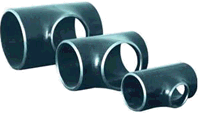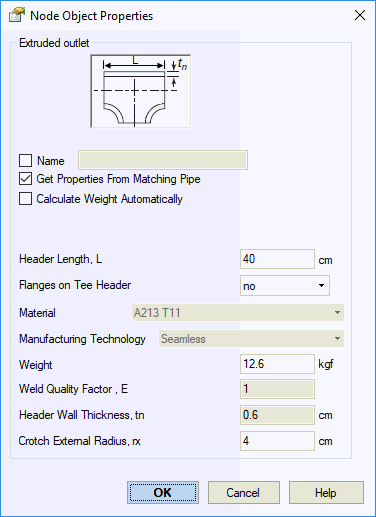





Property |
Description |
Name |
Element identifier. When checked, displays in the 3D model view. |
Get properties from matching pipe |
Automatically inherits header wall thickness, material, Wc factor, and other parameters from the connected pipe. |
Calculate weight automatically |
Calculates tee weight as the total volume of header and branch cylinders. |
Header length, L |
Length of the tee header section. Used for precise weight calculation. |
Crotch height, L1 |
Height from header OD to branch centerline. |
Tee height, H |
Vertical distance from header centerline to branch end. H = D/2 + L1 |
Material |
Material specification from the materials database |
Weight |
Tee bare weight excluding insulation and fluid contents. Uses standard value without overload factors. Fluid and insulation weights with applicable overload factors are automatically calculated from adjacent pipes. |
Longitudinal Weld Joint Efficiency Factor, E |
Longitudinal weld joint efficiency factor. More... |
Use notes 6,9,10 |
Apply when displacement cycles exceed 200.
|
Meet D1, Note 10 a,c,d,e,f |
|
Manufacturing technology |
For ASME B31.1, ASME B31.3, DL/T 5366-2014, seamless pipe uses Wl=1.0. Electric-welded pipe uses Wl from database. More... For GOST 32388-2013, material properties are sourced from different databases based on pipe type (seamless or welded). |
Flanges on tee header |
ASME B31J Note 7 requirement 0 - No flanges 1 - One flange (single header end) 2 - Two flanges (both header ends) |
Crotch radius, rx (r) |
Crotch radius. Defaults to branch OD/2 if rx=0. |
Nominal header wall thickness, tn |
Header wall thickness used for SIF, flexibility factor, and section modulus (Z) calculations. |
To insert an extruded outlet, select the target node and use:
Insert > Tee > Extruded Outlet
To view properties of an existing element:
Double-click the element in the 3D view
Select the
element and click  on the toolbar
on the toolbar